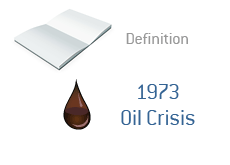Definition of 1973 Oil Crisis
What was the cause of the 1973 oil crisis? What happened during the 1973 oil crisis?
In order to learn the origins of the 1973 oil crisis, we need to take a step back to the Yom Kippur War, which took place from October 6th to October 25th, 1973. A coalition of Arab states attacked Israel, initially gaining some traction, only to be decisively beaten back. The result? An Israeli victory that very nearly led to a flare-up between the United States and the Soviet Union.
 The members of OAPEC (Organization of Arab Petroleum Exporting Countries) decided to retaliate in the form of an oil embargo. OAPEC claimed that they were undertaking the embargo to protest the United States' decision to re-supply the Israeli military during the Yom Kippur war.
The members of OAPEC (Organization of Arab Petroleum Exporting Countries) decided to retaliate in the form of an oil embargo. OAPEC claimed that they were undertaking the embargo to protest the United States' decision to re-supply the Israeli military during the Yom Kippur war. This embargo included a mandate to cut oil exports to "non-complying" nations, which including the United States and eventually the Netherlands.
Prices rocketed higher from a few dollars per barrel (in 1973 dollars) to well over $10 a barrel. Prices would not substantially pull back, and would actually spike once again (this time even more dramatically) with the onset of the 1979 oil crisis.
Arab oil ministers, with the exception of Libya, announced an end to their oil embargo on March 17th, 1974, after Israel withdrew the last of its troops from the west side of the Suez Canal.
The embargo had a dramatic effect on the global economy, as the price of oil ended up quadrupling to $12 a barrel.
--
Davemanuel.com Articles That Mention 1973 Oil Crisis:
The United States Public Debt, 1791 to 2010
Historical Gas Prices in the United States
Gold Still Well Off Of Its Inflation-Adjusted All-Time High
The Stock Market Crash of 1987 (Black Monday) Revisited
